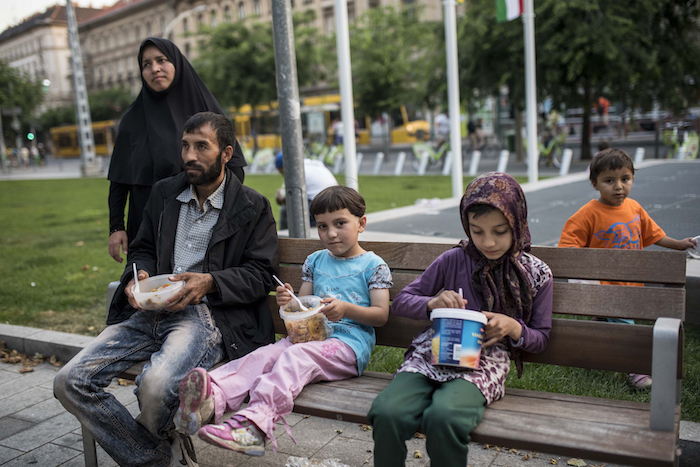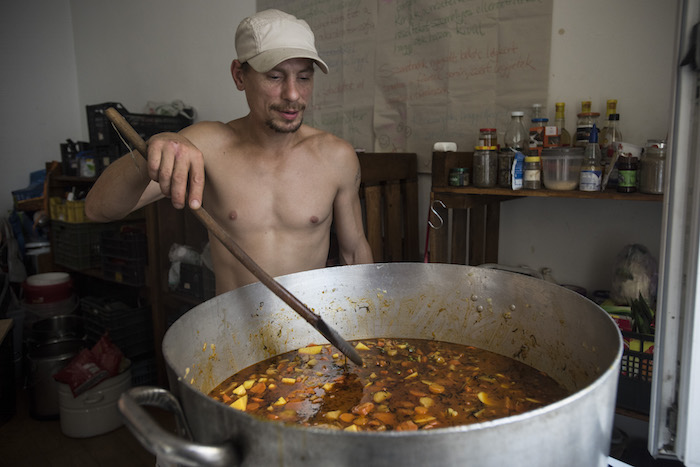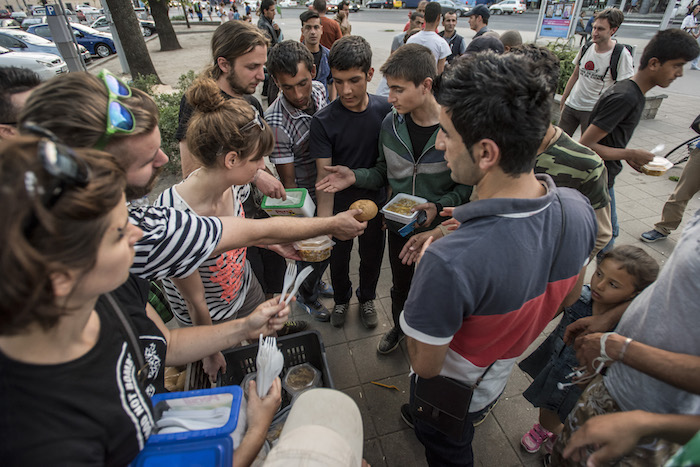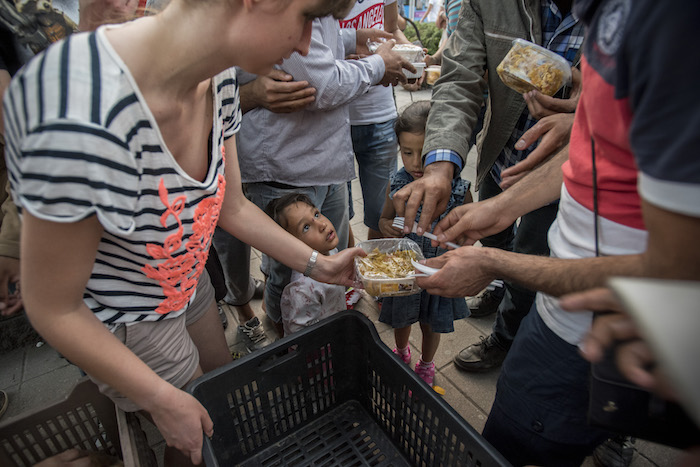 A group of volunteers cook and distribute food for asylum-seekers in Budapest.
A group of volunteers cook and distribute food for asylum-seekers in Budapest.UNHCR/Andras D. Hajdú
A group of volunteers cook and distribute food for asylum-seekers in Budapest.
UNHCR/Andras D. Hajdú
Lending a Hand in Hungary
Locals in the Hungarian capital are coming together to help exhausted asylum-seekers with food, clothes and kind words.
It is dusk by the time volunteers arrive at a busy square in central Budapest. With them, they carry hot food and fresh water – nothing short of a lifeline for the tired and hungry refugee families who are there to meet them. Little children are at first shy to accept the plates and spoons. However, when parents encourage them their faces light up, and they reach out for the meal eagerly.
“Tastes good,” nods one young Afghan mother, visibly grateful for her vegetarian dish after a long day of fasting during the holy month of Ramadan.
It takes just three minutes for the first 50 portions of food to disappear.
Here in Hungary, where around 70,000 asylum applications have been made so far in 2015 and 80 per cent of people arrive from conflict zones like Syria, many families roam the streets of Budapest in search of a place to rest. Some are on their way to designated reception centres within the country – others are waiting to move on to Western Europe.
Tonight’s group look lost and exhausted.
“We just want to survive,” says Afsar, a former construction worker and a father of four girls. He and his daughters arrived here from Afghanistan, after a perilous journey that took three months and all their savings. So far, they have survived on just bread, and Afsar is thankful for the hot food. “It has been a while since such a good thing has happened to us. I don’t know who these young girls and boys are, but they are good people, that’s for sure.”
The food is cooked and distributed by ‘Food Not Bombs’, a group of enthusiastic Hungarian volunteers who decided to take matters into their own hands after learning about desperate families like Afsar’s who are wandering Budapest. Ingredients are donated by vendors at the city’s food markets and meals are prepared by activists in one of the popular ‘ruin pubs’ of the capital. The small group has been cooking for the poor of this city for years.
“We just could not stand by and watch as women and children suffer,” says Judit Marta, one of the volunteers. “We would like to show that it is not very difficult to help.”
Judit says it is rewarding to see how much happiness one can bring to another human being by simply offering a dish at the right moment. “These people have gone through a lot, so some of them are surprised that we help without asking anything in return,” she adds.
“We would like to show that it is not very difficult to help.”
But ‘Food not bombs’ is just one of many groups in Hungary coming to the aid of asylum-seekers.
On Facebook, people are collecting food, water and clothes, and near the Serbian border, in the city of Szeged, residents offer food, blankets, toys, or even a lift in their vehicles for people stuck at the railway station when the last train pulls out. The local municipality is also helping with free wireless internet and mobile toilets.
This spontaneous goodwill and solidarity to help refugees has taken many by surprise, including the authorities.
Recently, UNHCR expressed strong concern over the Hungarian Government’s efforts to paint refugees as a threat to the country and launched its own poster campaign so that locals can learn more about refugees who find a home in Hungary and contribute to the country.
As night falls over the square, most people finish their food and begin to leave. Sixteen-year-old Tariq is among them. He arrived alone from Afghanistan and fears that he may have to return one day. Tonight, he will stay in Fót, on the edge of Budapest, in an institution where Hungary houses and educates unaccompanied children.
“All I want is a safe place to stay,” he says, quietly. “I don’t know whether it would be this country or some other place, but I am already grateful to Hungarians.”
“All I want is a safe place to stay.”
Ákos, who cooked today’s meal, knows how important positive action like this can be. “If there was war in my country, I would flee too,” he says. “Global problems can only be solved in unity.”
And his friend Ádám knows better than most.
“I was a homeless man standing at the other end of the queue,” he says. “Now I have place to stay and, trust me, it’s much better to go to sleep when you helped someone during the day.”










